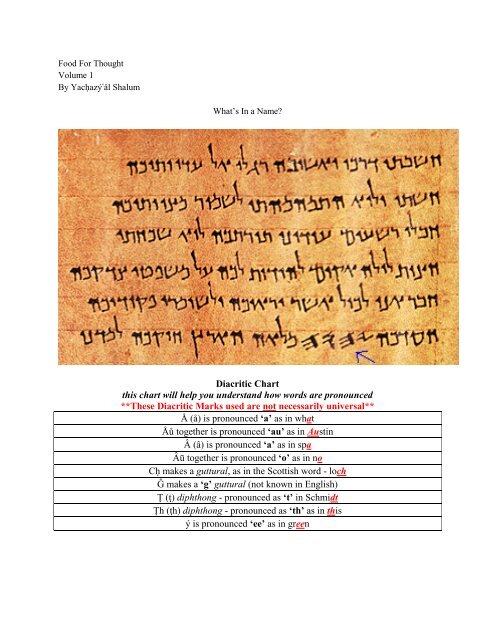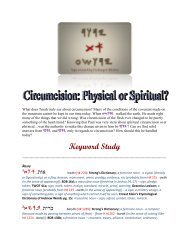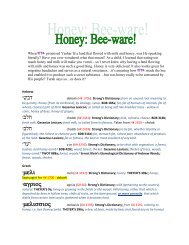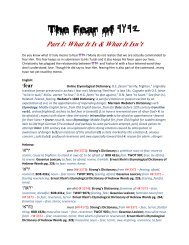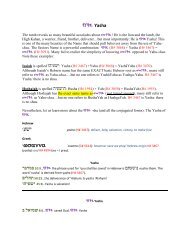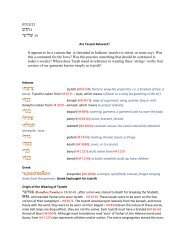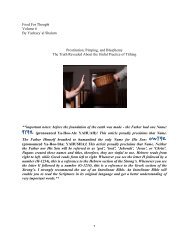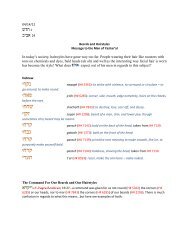What's In a Name? - Yahuah Is Life
What's In a Name? - Yahuah Is Life
What's In a Name? - Yahuah Is Life
You also want an ePaper? Increase the reach of your titles
YUMPU automatically turns print PDFs into web optimized ePapers that Google loves.
Food For Thought<br />
Volume 1<br />
By Yacḥazý῾ål Shalum<br />
What’s <strong>In</strong> a <strong>Name</strong><br />
Diacritic Chart<br />
this chart will help you understand how words are pronounced<br />
**These Diacritic Marks used are not necessarily universal**<br />
Å (å) is pronounced ‘a’ as in what<br />
Åů together is pronounced ‘au’ as in Austin<br />
 (â) is pronounced ‘a’ as in spa<br />
Âū together is pronounced ‘o’ as in no<br />
Cḥ makes a guttural, as in the Scottish word - loch<br />
Ĝ makes a ‘g’ guttural (not known in English)<br />
Ṭ (ṭ) diphthong - pronounced as ‘t’ in Schmidt<br />
Ṭh (ṭh) diphthong - pronounced as ‘th’ as in this<br />
ý is pronounced ‘ee’ as in green
<strong>In</strong>troduction<br />
Shalum to you all! I hope that this article finds you in good health as you go about your daily journey,<br />
eagerly anticipating the return of Mashýacḥ. The purpose of this article is to equip you with vital<br />
information concerning true worship of the Father and His Son. Since the Son Himself made it<br />
abundantly clear that the Father is a ruacḥ (wind/breath/none flesh) and the only way to worship Him is in<br />
ruacḥ and truth (Yahucḥanan/John 4:24), it is of the utmost importance to know who He is. Let me ask<br />
you a question: does it really make a difference what we call the Most High Many say it does not matter<br />
because “god” knows their heart (be sure to request a copy of Food For Thought Volume 5: My God,<br />
My Lord). Many Sacred <strong>Name</strong> groups believe that terror and destruction will descend down upon those<br />
who violate the third command found in Shamuṭh/Exodus 20:7. Shamuṭh/Exodus 20:7 reads, “You<br />
shall not lift up/take away ta the <strong>Name</strong> of hwhy your Ålahým to ruin/desolation, for hwhy ta will<br />
not leave unpunished he who lifts up ta His <strong>Name</strong> to ruin.” The first thing we must acknowledge is<br />
the command concerning His <strong>Name</strong>. Just as He said adultery, murder, and idolatry were sins - He also<br />
said to lift up/take away His <strong>Name</strong> to ruin was as well. He then says the one who does this shall not be<br />
left unpunished (His <strong>Name</strong> has been taken away from English translations almost 7,000 times). All of this<br />
was sealed with ta: the mark of the Mashýacḥ. I do hope you bring this scripture to mind the next time<br />
you think to yourself “He has many names,” or “What difference does it make - He knows whom I am<br />
speaking of.” It matters because it is a command. After all, should I call you Anthony if your name is<br />
Terrance<br />
Although His <strong>Name</strong> is truly written as hwhy in the ancient script (some say Paleo), most are familiar with<br />
the modern Aramaic script referred to as Hebrew: .יהוה For this reason, I will use the modern script to<br />
break down His <strong>Name</strong>.<br />
From God, to Lord, to Jehovah, to Yahweh, there are so many names used when speaking of the Most<br />
High. Does knowing the <strong>Name</strong> really matter The <strong>Name</strong> will be upon the foreheads of those spoken of in<br />
Cḥazun/Revelation 22:4. When the Mashýacḥ prayed so vehemently in Yahucḥanan/John 17, He<br />
repeatedly told the Father that He had indeed guarded and revealed The <strong>Name</strong> (verses 6, 11, 12, and 26<br />
respectively). If there are hundreds of scriptures dealing with The <strong>Name</strong>, should we not know The <strong>Name</strong><br />
Many scriptures tell of healing, joy, deliverance, salvation, and even power over demonic forces, all<br />
found <strong>In</strong> The <strong>Name</strong>. How can these scriptures be accurate if the <strong>Name</strong> is not important If you can truly<br />
look at these passages and still dismiss the importance of The <strong>Name</strong>, I would suggest you stop reading
this article; it will be of no use to you. However, if you now realize that The <strong>Name</strong> does matter, your<br />
repentance begins now!<br />
Let us take an extensive look through various witnesses concerning this subject. If you are using a King<br />
James translation, I recommend you retire it and find an <strong>In</strong>terlinear translation. Since the accounts that we<br />
have today were given to use in Hebrew/Aramaic and Greek, reading from those languages are crucial in<br />
regards to knowing what the original text stated. Only then can you begin to understand the complexity of<br />
the topic at hand. We will discover the importance of the <strong>Name</strong>, and why using false names and/or certain<br />
titles, may actually hinder our relationship with our Creator.<br />
The ONLY <strong>Name</strong> Ever Given יהוה<br />
“What is His <strong>Name</strong>, and what is His Son’s <strong>Name</strong>: If you know it!” This powerful passage found in<br />
Mashlý/Proverbs 30:4 is a beautiful invitation to search out the only <strong>Name</strong> ever given by the Most High:<br />
I am !יהוה (Shamuṭh/Exodus 6:6). <strong>In</strong> the beginning, humankind spoke one language<br />
(B-r῾åshýṭh/Genesis 11:1). Although there are many arguments surrounding the original language spoken<br />
by humankind, the Hebrew language is the language in which the Ṭurah (and His <strong>Name</strong>) was written in.<br />
For this reason, it is important to understand Hebrew (Âbrý) when it comes to understanding the <strong>Name</strong> of<br />
the Father.<br />
The translation of languages can be confusing. The full meaning of some words may not carry over well<br />
into the next language, and even when they do; subtle changes are often made by translators, which can<br />
distort or pollute our understanding. <strong>Name</strong>s are different because they are not translated: they are<br />
transliterated. When names are transliterated, the function of the alphabetical characters from the<br />
original word are being carried over (matched) to the same functional alphabetical characters of<br />
the next language; thus preserving the sound. If this is confusing, note the difference in definitions<br />
between translate and transliterate:<br />
translate: if something that someone has said or written is translated from one language into another, it<br />
is said or written again in the second language. If a name, a word, or an expression translates as<br />
something in a different language, that is what it means in that language.<br />
transliterate: "to write a word in the characters of another alphabet," 1861, apparently coined by<br />
German philologist Max Müller (1823-1900), from trans- "across" (see trans-) + Latin littera (also litera)<br />
"letter, character" (see letter).<br />
Here are a few examples of translation vs. transliteration:<br />
Example 1: barak (Hebrew) is translated as favor (English).<br />
Example 2: גדליהו (Hebrew) is transliterated as GadalYahu (English).<br />
Example 3: גדליהו (Hebrew) is transliterated as GadalYahu (English), and it means (translation) Yah<br />
has become great (English).
Notice: <strong>In</strong> example #1, the meaning of the Hebrew word was given, but in example #2; it was not.<br />
Example #2 only contains the way the name would be written in the English, but the word still had not<br />
been translated until example #3. Remember, names are not translated, they are transliterated.<br />
Once we begin to understand and apply this rule, we can more effectively grab hold of the fact that no<br />
matter what language we speak: people’s names are always the same. Michael Jordan is Michael Jordan<br />
in every language. There may be a few nuances in the way different accents annunciate the name - but the<br />
ultimate goal is to get as close to the original sound as possible, matching alphabetical function to<br />
function: this is called transliteration. Jean Claude Van Damme is Jean Claude Van Damme in every<br />
language. With Van Damme, we even try our best to pronounce “Jean” as “Zjhaun”, so as to pronounce<br />
his name the way it should be. <strong>Name</strong>s don’t change. Unfortunately, this has not been the case in<br />
transliterating the Father’s <strong>Name</strong>. The Father’s <strong>Name</strong> has been removed from virtually every English<br />
translation (almost 7,000 times), and has been replaced with titles like “lord” and “god.” Remember<br />
commandment #3: Shamuṭh/Exodus 20:7 reads, “You shall not lift up/take away ta the <strong>Name</strong> of<br />
hwhy your Ålahým to ruin/desolation, for hwhy ta will not leave unpunished he who lifts up ta<br />
His <strong>Name</strong> to ruin.” Do you think that removing His <strong>Name</strong> almost 7,000 times is not truly the same as<br />
taking it away<br />
Because of our sins, we are captives in a world that does not respect the <strong>Name</strong> of .יהוה Many religious<br />
sects have gone through great extremes to mask the true <strong>Name</strong> of the Sovereign of the Universe. Let us<br />
begin with a letter for letter transliteration of יהוה and learn what His <strong>Name</strong> really is.<br />
And The <strong>Name</strong> <strong>Is</strong><br />
“Thus you are to say to the children of Yashar῾ål/<strong>Is</strong>rael: ,יהוה Ålahým of your fathers has sent me to<br />
you. THIS IS MY NAME FOREVER!!! AND THIS IS MY MARK TO ALL<br />
GENERATIONS!” Shamuṭh/Exodus 3:15. The evidence is very clear: the Most High had a specified<br />
<strong>Name</strong> that could never change! It is important to remember that I am writing the Father’s <strong>Name</strong> as it<br />
יהוה appears in the <strong>In</strong>terlinear text, making use of the Modern Hebrew script. How do we pronounce<br />
The first letter from the Hebrew in the <strong>Name</strong> is yd .י The yd makes the ‘y’ sound as in yard, this is<br />
transliterated into English with the letter ‘Y’. The next letter is ha .ה Ha makes a breathy ‘h’ sound as in<br />
hhop (when it is not the first letter of a word, ha will render a breath sound, depending on the letter<br />
preceding it - i.e. Judah), this is transliterated into English with the letter ‘H’. Now we have ‘YH’, which<br />
is pronounced YAH. Many stop here because of the wording found in Ṭahalým/Psalms 68:4, “By His<br />
<strong>Name</strong> YAH,” but this song was written long after the fuller form of the <strong>Name</strong> we are dissecting (You<br />
will also note that YAH (H# 3050) is a shortened form of the word we are now trying to break down:<br />
Some translations render ‘YAH’ as ‘JAH’. There is no sound similar to the sound made by the .(יהוה<br />
letter ‘j’ in Âbrý, and the use of the letter ‘j’ in English as a hard consonant is only a few hundred years<br />
old (it originally made the ‘y’ sound as well). If you look at a dictionary of Hebrew words for the word<br />
‘JAH’, you will see the Strong’s H# 3050. When you turn to H# 3050, you will see that ‘JAH’ in Hebrew<br />
is yd ha ,יה and renders a pronunciation of ‘YAH’; (the extra ‘h’ listed by Strong’s is used to illustrate
that the ‘ha’ yields a breathy sound). So, the first two letters of the <strong>Name</strong> will give us ‘YAH’ not ‘JAH’.<br />
Keep in mind, when you say Hallelujah, despite the suffix JAH, you actually pronounce it as Yah..<br />
The next letter of the <strong>Name</strong> causes much confusion, but since we are doing a letter for letter<br />
transliteration of the <strong>Name</strong>: let us break down the uau ו (pronounced oo-au , but very quickly, in a<br />
smooth breath). Remember, we are trying to transliterate from Âbrý to English…so all we need is<br />
undeniable proof of what sound the uau makes when it follows yd ha .(יה) Let us look at some examples<br />
:(יה ו ( uau of yd ha +<br />
1. H# 138: אדנ (Ådn) + יהו (Yhu) = אדניהו (ÅdnY a hu)<br />
2. H# 29: אב (Åb) + יהו (Yhu) = אביהו (ÅbY a hu)<br />
3. H# 558: אמץ (Åmts) + יהו (Yhu) = אמציהו (Åm a tsY a hu)<br />
4. H# 5818: עז (Âz) + יהו (Yhu) = עזיהו (ÂzY a hu)<br />
5. H# 6271: עתל (Âthl) + יהו (Yhu) = עתליהו (Âth a lY a hu)<br />
6. H# 5838: עזר (Âzr) + יהו (Yhu) = עזריהו (Âz a rY a hu)<br />
7. H# 683: אצל (Åtsl) + יהו (Yhu) = אצליהו (Åts a lY a hu)<br />
8. H# 5812: עזז (Âzz) + יהו (Yhu) = עזזיהו (Âz a zY a hu)<br />
9. H# 5718: עד (Âd) + יהו (Yhu) = עדיהו (ÂdY a hu)<br />
10. H# 5662: עזז (Âbd) + יהו (Yhu) = עזזיהו (Âb a dY a hu)<br />
These are merely ten of more than one hundred examples that witness to the basic function of the uau<br />
character: an oo sound (as in cool). Without fail, yd ha uau ,יהו will always render the sound of ya-hoo<br />
(written as Yahu). The final letter of the Father’s <strong>Name</strong> is ha .ה The ha ה normally gives the ‘h’ sound at<br />
the beginning of a word. If the ha ה comes in the middle or at the end of a word (in most cases), the sound<br />
is changed to a breathy ‘ahh.’ This is why ha uau ha הוה gives HU-AH (hoo-ah) and not HUH (hoo).<br />
Now, when we put it all together, the Father’s <strong>Name</strong> is yd ha uau ha :יהוה Y A HU A H (Ya-Hoo-Ah)!<br />
<strong>Yahuah</strong> & Yahudah<br />
Now, let us look at Yahudah (Judah) and discover how this tribe carries the <strong>Name</strong> of the Father. Yahudah<br />
is written as yd ha uau dalath ha יהודה (dalath gives the d sound). Yahudah has five Hebrew letters and<br />
<strong>Yahuah</strong> has four. The difference between <strong>Yahuah</strong> יהוה and Yahudah יהודה is the dalath .ד If you<br />
:יהוה you now have yd ha uau ha ,יהודה from Yahudah ד remove the dalath<br />
YAHU~ AH! A beautiful transliteration of the most Set-Apart <strong>Name</strong> one could ever speak: YAHUAH!<br />
The <strong>Name</strong> of the Father is YAHUAH (English) - יהוה (Modern Hebraic script) - hwhy (Ancient script).<br />
Yahweh
Without fail, yd ha uau יהו will render the sound of ya-hoo (written as Yahu). Words in the Âbrý are<br />
easily broken down into primary root words. Yahudah (Judah) is broken down into two separate words:<br />
Yah (H# 3050) and Hud (H# 1935) – Yahudah. YAHUAH is broken down into two root words: Yah (H#<br />
3050) and Huah (H# 1933) – <strong>Yahuah</strong>. Yahweh contains Yah (H# 3050), but there is no Hebraic use of<br />
Weh: it does not exist.<br />
Words all change with the removal of a letter, but the general annunciation remains the same. World<br />
becomes word with the removal of the letter l. Hope becomes hop with the removal of the letter e. Same<br />
becomes Sam with the removal of the letter e. Yahudah becomes <strong>Yahuah</strong> with the removal of the letter d.<br />
When we refer to the Father יהוה as Yahweh, we are saying that Yahudah becomes Yahweh with the<br />
removal of the d (remember <strong>Yahuah</strong> and Yahudah have the exact same Hebrew spelling with the<br />
exception of the letter d: .(יהודה…יהוה Yahudah would have to be written as Yahwdeh in order to<br />
become Yahweh with the removal of the letter d.<br />
The Romans served a deity who was the same as Zeus, and his name was Jove (properly written as Ioue).<br />
At first glance, we would pronounce this word as Jove in English, but Romans spoke Latin that was<br />
derived from Greek. Let us break down Jove:<br />
J – Came from the letter i, which is from the Greek Iota: (pronounced ee).<br />
O – The Latin O is pronounced as the Greek Omicron: (pronounced ah).<br />
When linked together, the Iota and the Omicron - -are pronounced as ee-ah and written<br />
as Ia(h). Ia(h) was the way both Romans and Greeks pronounced Yah!<br />
V – The Latin V was pronounced as the letter U: (the ‘oo’ sound)…We now have ee-ah-o.<br />
E – The Latin E was taken from the Greek Eta: …making the eh sound… We now have ee-ah-oo-eh<br />
Sound it out quickly…what are you now saying<br />
<strong>In</strong> Latin (a language derived from Greek), Jove would have been pronounced ee-ah-oo-eh: Iaueh, which<br />
would later become Iaveh/Iahweh (as v and w merge as transliterations for the letter u), until finally<br />
being passed off as a Hebrew word: Yahweh. Yahweh is Jove (Ioue), the sky god of the Romans,<br />
worshipped as Zeus/Jupiter by the Greeks. It is highly possible that this hybrid was also a corrupt<br />
rendering of the <strong>Name</strong> of the Father, but nevertheless…it violates the 3rd command. Many have not fully<br />
researched the etymology of Yahweh (a strange spelling that was unknown before the 1800’s):<br />
Yahweh
1869, hypothetical reconstruction of the tetragrammaton<br />
YHWH (see Jehovah), based on<br />
the assumption that the tetra-grammaton is<br />
the imperfective of Hebrew verb hawah,<br />
earlier form of hayah "was," in the sense of<br />
"the one who is, the existing."<br />
http://www.etymonline.com<br />
The only <strong>Name</strong> for the Father, given by the Father, was yd ha uau ha <strong>Yahuah</strong> .יהוה I would also like to<br />
admonish all of you not to use the tetra-grammaton (4 letters) spelling of YAHUAH (YHWH); (YHWH<br />
is the four letter rendition of Yahweh, not YAHUAH (YHUH).<br />
Conclusion of the Matter…<br />
Ultimately, my goal for the Food For Thought article is to assist each of you as you make your way back<br />
to the heart of service to hwhy. Over the next few articles, we will do an in dept study of all names and<br />
titles associated with the Father and Son. I urge you to consider one thing: everyone has a name. A man in<br />
covenant to Tonya would not call her Tammy. A woman in covenant to Abraham would not call him<br />
Anthony. If the Father specifically told His people not to ruin His <strong>Name</strong> (Shamuṭh/Exodus 20:7), and<br />
that His <strong>Name</strong> was forever (Shamuṭh/Exodus 3:15): should we not give Him 1,000,000 times more<br />
respect than we do to man We must know and call upon His <strong>Name</strong>.<br />
If you are still not convinced on the importance of the <strong>Name</strong>, may hwhy allow these scriptures to open<br />
your mind to the simplicity that only His revelation could reveal: Luke 21:12-17 (we shall be hated<br />
because of the <strong>Name</strong>)...YaramYahu/Jeremiah 23:27 (His people forgot His <strong>Name</strong> for<br />
B῾âl)...Ṭahalým/Psalms 72:17 (His <strong>Name</strong> is forever)...YashâYahu/<strong>Is</strong>aiah 42:8 (YAHUAH: that is My<br />
<strong>Name</strong>).
Your servant in the work of hwhy and [fwhy<br />
Yacḥazý῾ål YacḥazaqYahu Shalum<br />
mwlF whyqzxy layzxy<br />
yachazyal@yahuahislife.com<br />
www.yahuahislife.com<br />
www.youtube.com/user/yachazyel<br />
www.yachazyal@gmail.com<br />
Skype: Yachazyel Shalum<br />
©2010 Yachazy‘al Shalum<br />
All Rights Reserved


